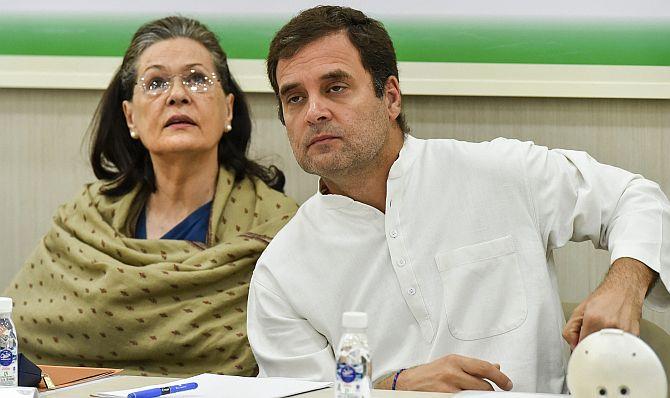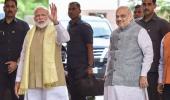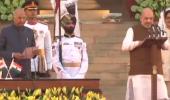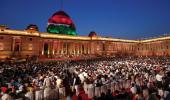'The Congress may not be able to dump the family entirely, but it could move to a new operating model in which the family takes a 'chairmanship' role while day-to-day affairs are handled by a new CEO.'

"The family is the glue that holds the party together. But it is also the reason so many people have such deep-seated resentment towards the party."
Milan Vaishnav, Director of the South Asia Program and Senior Fellow at the Carnegie Endowment for Peace in Washington, DC, discusses the relevance of the Congress in the wake view of yet another crushing defeat at Narendra Damodardas Modi's hands in the concluding part of the interview with Rediff.com's Archana Masih.
- Part 1: 'Modi can't afford a slow start'
How relevant is the Congress and what is its future? Is it time for the Gandhis to give up the leadership for the party's survival?
The Congress is relevant insofar as one in five Indians still votes for it. This was true in 2014, and it's true again in 2019.
20 percent vote share seems to be a floor for the Congress.
Unfortunately for it, it also appears to be a ceiling!
There are still enough two-party states which feature bipolar competition between the BJP and the Congress for the latter to remain viable.
But the leadership question is absolutely central. I think the party faces a Catch-22.
The family is the glue that holds the party together. But it is also the reason so many people have such deep-seated resentment towards the party.
My own view is that the party may not be able to dump the family entirely, but it could move to a new operating model in which the family takes a 'chairmanship' role while day-to-day affairs are handled by a new CEO.
Is the Congress doomed to extinction?
Despite its repeated foibles, there is still no other pan-Indian Opposition party.
In that sense, the Congress is not doomed to extinction.
But it showed very little capacity for introspection after 2014. It had its head in the sand for years after that humbling defeat.
Will it face up to its weaknesses after the 2019 debacle? Most analysts are not holding their breath. But if it is able to rededicate itself to building powerful state organisations with charismatic, independent power centres that are not simply sycophants to the dynasty, then we might see some progress.
Do you think the BJP dominance will last as long as the Congress dominance once did?
This is impossible to say. It is clear that Modi and (Bharatiya Janata Party national President Amit Anilchandra) Shah have many factors working in their favour.
First, they have built an impressive organisational machine, backed by modern technology.
Second, they have a massive fundraising advantage over Opposition parties.
Third, Modi is head and shoulders above all other Opposition figures in terms of his popularity.
Fourth, the BJP has become a catchall party insofar as it appeals across caste lines, across regional geographies, and across urban-rural parts of India.
This is why I have said it has remade the Congress dominant party system in its own mould.
Is the BJP now tethered to Narendra Modi's personality?
This is the biggest downside risk in my view.
The Congress's best case is to try and turn itself into the party the BJP was in the early 2000s: A collection of seven or eight powerful regional franchises which worked together at the national level.
The BJP has moved in the opposite direction by centralising so much power within the prime minister and Amit Shah.
This works well as long as the party keeps winning. But if Modi's popularity dips for any reason, the party's fall could be steep.
The way Modi has saturated the political space and dwarfed Opposition leaders -- what does it mean for Indian democracy?
It means that Indians, like Americans and so many others, are yearning for strong, centralising leadership. I think centralised power can pose a risk to Indian institutions, as we have seen over the past five years.
This is the same threat Trump poses to American institutions.
I am not equating Modi and Trump; they are different in many respects, not least the fact that Modi is an experienced politician who ran a significant state for over a dozen years.
The point is that there is a longing for a strong leader who can curb political fragmentation and take the 'tough decisions'. Especially in a context of entrenched elitism, privilege, and inequality.
There is a positive element of this trend, which is the recognition that there has been a big disconnect between 'elite' and 'ordinary' India.
Given his life story, his humble roots, the evolution of his career, and his caste, Modi's personal attributes clearly resonate with a broad section of Indian society who seem themselves in him.
Will a resurgent Hindu nationalist leader in a second term steer India towards a Hindu Rashtra?
There are many liberals who genuinely worry about this outcome. Ultimately, we know that is the Sangh's larger political project.
Modi, however, is a pragmatic leader who also understands what the Indian polity will bear in terms of constitutional, structural changes.
I think we are likely to see more of what we saw in the first term. Between 2014 and 2019, Modi did not push for legal and constitutional changes to enforce a new Uniform Civil Code, augment or eliminate Jammu and Kashmir's constitutional status or build a Ram Mandir in Ayodhya.
Instead, he opened up space for pro-Hindu policies at the state and local levels. This means rewriting school textbooks, renaming cities and towns, inculcating adherence to a basic set of core Hindu social principles.
I expect we will see more of these changes, which are disparate and do not necessarily take place in respond to central directive.
I think the emphasis is on remaking, through social norms and behaviours, a new polity that is affirmatively more Hindu in nature that what has preceded it.










